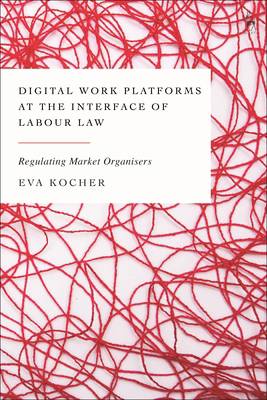
Je cadeautjes zeker op tijd in huis hebben voor de feestdagen? Kom langs in onze winkels en vind het perfecte geschenk!
- Afhalen na 1 uur in een winkel met voorraad
- Gratis thuislevering in België vanaf € 30
- Ruim aanbod met 7 miljoen producten
Je cadeautjes zeker op tijd in huis hebben voor de feestdagen? Kom langs in onze winkels en vind het perfecte geschenk!
- Afhalen na 1 uur in een winkel met voorraad
- Gratis thuislevering in België vanaf € 30
- Ruim aanbod met 7 miljoen producten
Zoeken
Digital Work Platforms at the Interface of Labour Law
Regulating Market Organisers
Eva Kocher
Hardcover | Engels
€ 203,95
+ 407 punten
Uitvoering
Omschrijving
This book shows how to design labour rights to effectively protect digital platform workers, organise accountability on digital work platforms, and guarantee workers' collective representation and action. It acknowledges that digital work platforms entail enormous risks for workers, and at the same time it reveals the extent to which labour law is in need of reconstruction.
The book focusses on the conceptual links - often overlooked in the past - between labour law's categories and its regulatory approaches. By explaining and analysing the wealth of approaches that deconstruct and reconceptualise labour law, the book uncovers the organisational ideas that permeate labour law's categories as well as its policy approaches in a variety of jurisdictions. These ideas reveal a lack of fit between labour law's traditional concepts and digital platform work: digital work platforms rarely behave like hierarchical organisations; instead, they more often function as market organisers.
The book provides a fresh perspective for international academic and policy debates on the regulation of digital work platforms, as well as on the purposes and foundations of labour law. It offers a way out of the impasse the debate around labour law classification has reached, by showing what labour law could learn from digital law approaches to platforms - and vice versa.
The book focusses on the conceptual links - often overlooked in the past - between labour law's categories and its regulatory approaches. By explaining and analysing the wealth of approaches that deconstruct and reconceptualise labour law, the book uncovers the organisational ideas that permeate labour law's categories as well as its policy approaches in a variety of jurisdictions. These ideas reveal a lack of fit between labour law's traditional concepts and digital platform work: digital work platforms rarely behave like hierarchical organisations; instead, they more often function as market organisers.
The book provides a fresh perspective for international academic and policy debates on the regulation of digital work platforms, as well as on the purposes and foundations of labour law. It offers a way out of the impasse the debate around labour law classification has reached, by showing what labour law could learn from digital law approaches to platforms - and vice versa.
Specificaties
Betrokkenen
- Auteur(s):
- Uitgeverij:
Inhoud
- Aantal bladzijden:
- 288
- Taal:
- Engels
Eigenschappen
- Productcode (EAN):
- 9781509949854
- Verschijningsdatum:
- 7/04/2022
- Uitvoering:
- Hardcover
- Formaat:
- Genaaid
- Afmetingen:
- 156 mm x 234 mm
- Gewicht:
- 576 g

Alleen bij Standaard Boekhandel
+ 407 punten op je klantenkaart van Standaard Boekhandel
Beoordelingen
We publiceren alleen reviews die voldoen aan de voorwaarden voor reviews. Bekijk onze voorwaarden voor reviews.









